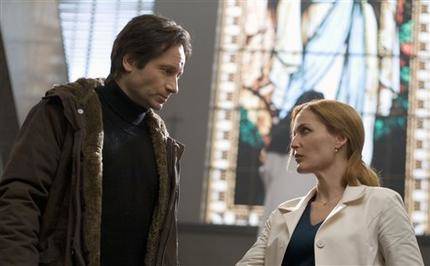Dana Scully and the Agonies of Being Catholic
The X-Files: I Want to Believe is about two former FBI Agents, Fox Mulder (David Duchovny) and Dana Scully (Gillian Anderson), who see their respective religious beliefs challenged, if not dashed, while being drawn back into action as consultants in the investigation of a series of kindappings. During the movie, Mulder is repeatedly entreated to give up his quest to prove the existence of aliens and find a long-lost sister who is most certainly dead by now. Scully, however, finds her faith in God, and her affiliation with the Catholic Church, challenged repeatedly.
Now, this needs to be said: it isn't a perfect movie. On an enjoyment scale, I'd give it about 2 and 1/2 stars. However, I understand why Roger Ebert rated it 3 and 1/2 stars. He argues that it is smart, it is "about something" and it is deeply concerned with issues of ethics and religion. He is also glad that there's no flashy explosions or high-octane gunfights in it. He's right on all counts.
As lovely as Gillian Anderson is (and I have long had a crush on the actress), Scully tends to be an annoying character, because she is a skeptic in a world in which EVERYTHING has a supernatural explanation. Also, the role is not as feminist and progressive as it should be because Scully is often left largely out of the action in the final few minutes of each X-Files adventure because she can only see so many incredible sights before ceasing to be a skeptic. Therefore, Mulder, as inept as he is, usually gets to do all the jumping onto moving trains and fistfights with the main villain. However, in this new film, Scully gets the most interesting storyline.
At the start of the film, viewers learn that Scully has left the FBI and is a doctor in a Catholic hospital. She is treating a boy with a disease that likely has no cure. However, groundbreaking and radical treatment involving stem cells might save the boy's life. The priests and nuns oppose the procedure, making the excuse that it will probably fail and cause the boy pain. The priest in charge of the hospital, Father Ybarra, wants the boy transferred to hospice care so he can die "in peace" and not undergo unnecessary, painful, and probably unsuccessful treatments. What is not stated overtly, however, is the fact that the priests and the nuns have qualms with the use of stem cells to treat the boy. After all, the pro-life position of the Catholic Church backs many priests and nuns into opposing stem cell research and invitro fertilization. While the film does not make any of the clergy characters speak this objection, it is a strong subtext of the film.
For her part, Scully has many sleepless nights, crying over the boy's pain and angrily cursing God for bringing an innocent boy into the world just to allow him to contract a horrendous, fatal disease. She is only able to overcome this anger by defying the priests and convincing the boy's parents to approve the risky procedure. While we do not know whether the surgery works in the end, the film asks us, and Scully, to have faith that the boy will be saved, and that she has made the right decision defying the head priest.
Another, more prominent, Catholic priest features in the film. Father Joe (Billy Connolly), is a pedophile who hates himself for molesting 37 altar boys. He tries to fight the urges, castrates himself, and lives in a self-policed community of sex-offenders. He approaches the FBI at the start of the film because he has visions of women being kinapped that correspond to real missing persons cases. His visions are reliable, and provide numerous breakthroughs, but many of the agents are too empirical and hard-headed to accept Father Joe's visions as being bona fide. Scully, for her part, cannot believe that God would give visions to a pedophile priest when he gives no such visions to a good person ... like her. She feels lost and is hungry for God's voice, and will not accept that God is capable of forgiving someone who doesn't deserve forgiveness. Interstingly, the film argues that God can, and does, forgive Father Joe, and the visions are, indeed, presented as bona fide. Ironically, the perpetrator of the kidnappings winds up being one of Father Joe's former victims, making his visions as much justice and punishment as they are a gift. By the end of the film, Scully appears to have made some peace with Father Joe, and given him a measure of forgiveness and acceptance herself.
As it happens, the villians of the film are also engaged in radical medical treatment. They are kidnapping healthy young women and harvesting their organs and body parts to keep a rich patient alive while an incurable disease ravages his body. The Frankenstein-like procedure (which results in a patient who gets to keep his own head, but lives in a fresh body created by parts sewn together from a variety of kidnap victims) turns out to be a Russian experimental procedure that was the precursor to contemporary stem cell surgery. In effect, the villains are ruthless doctors with no moral center.
The film does not state the message directly, but it hints at the following: Dana Scully's use of stem cell research is not immoral. It is not the harvesting of innocent body parts to keep a young boy alive. It is caricatured by overzealous religious folks as evil, but the process the clergy opposes is not evil. The Russian doctors who serve as the villains of the film are performing surgeries that cross the line and are, indeed, the kind of evil harvesting the priest's oppose. But common sense sees a distinction between Scully and the Russians. That is the moral of the film, even if it dances around that message as much as it spells it out with its frequent graphic shots of severed arms.
Interestingly, while the film is not great, I felt a strong kinship to the character of Scully and the religious suffering she endures. She believes in God, and she is a "good" Catholic (from a non-doctrinaire point of view), but she is horrified by pedophile priests and cannot, in good conscience, support the Church's opposition to stem cell research. Quite frankly, it was those very issues, and the possible zealous motivations of the September 11 terrorists that drove me away from religion by the end of 2002. There is a part of me that admires Scully for still being religious in light of all that happened to push me away from religion in general and Catholicism in particular. There is another part of me that wishes that Scully would just work in a public hospital, where she can perform whatever surgery she sees fit without being hamstrung by religious concerns.
On the other hand, perhaps it is just as well Scully is at this Catholic hospital. If she wasn't there, where she was needed, the boy wouldn't have gotten the treatment he needed to survive.
Therefore, while being Catholic seems to make Scully miserable, it is probably good for all of us that she is Catholic. And it is good for the patients at the hospital she works at and stays just where she is - a troublemaker at the heart of a Roman Catholic institution.





































i-Italy
Facebook
Google+
This work may not be reproduced, in whole or in part, without prior written permission.
Questo lavoro non può essere riprodotto, in tutto o in parte, senza permesso scritto.